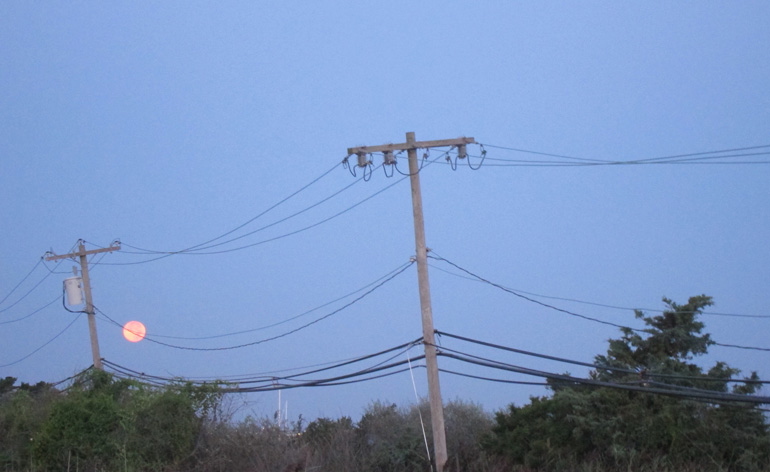Gotham Diary:
Plutarch
31 August 2012
From the time I left the house to pick up Kathleen at the ferry until the moment, almost two hours later, when we sat down to dinner, I was what we call a cranky-puss. I was angry at the air, for one thing. It seemed that the afternoon’s breezy cool and dry weather — so cool and dry that I had closed a few of the sliding-glass doors and turned off the ceiling fans — had been replaced by a warm, wet mat. Hauling the wagon back to the house made me quite sticky. Although I was delighted to be with Kathleen, I couldn’t stop myself from complaining. At the stove, preparing a nice, thick ham steak, with baked potatoes and asparagus, I was stupd, shutting off the burner that I needed while the other one blazed away. It didn’t help that, by the time we sat down, I had not been up so late in well over a week. When the dishes were washed and I could go to bed, it was past midnight. That fact alone was depressing. As a sort of bedtime present, the Internet connection failed. (Not to worry; I had my MiFi card — but, still.)Â
Something about Bob Spitzs’ account of Julia Child’s last years hung over me: aches and pains. For a few weeks (all right, over a month), my right knee has been giving me a good deal of pain, and when I get back to town I am going to have to have it looked at. My two weeks on the beach have not restored me to the (imaginary only) energetic outlook that I was hoping for. Julia Child was 36 years older than I, and did most of her suffering in her late eighties and early nineties. I am a mere 64. But then, she took care of herself, and had a naturally robust constitution. (She played college basketball, remember.) I like to bloviate about the advantages of age and wisdom, but those very boons were unavailable to me last night.
So I’m doubly glad to be done with Dearie. First, it was not an agreeable read, not my sort of book at all. (“That was twice as much as what people were accustomed to paying for a cookbook, and there was competition up the wazoo. [!!] That season, cookbooks were ridiculously plentiful.” What’s ridiculously plentiful is Bob Spitz’s “carload upon carload” of bedizened cliché.) Second, it was a book about physical decline. Paul Child appears to have begun falling apart the moment Mastering the Art of French Cooking appeared, and it would take him thirty years more to disappear. Julia was a stout campaigner who clearly fed on audience response, as all entertainers do. Never a fan of her work in television (never a fan of anybody’s), I had taught myself to regard Julia Child as an important writer on the subject of food, and the dictator (if not the actual writer) of a delightful memoir about being an American in Paris. I didn’t know that she was a regular on David Letterman’s show, much less on Good Morning America. (Who watches such shows, and where on earth do they find the time?)
Through Norah Eprhon’s wonderful movie, Julie and Julia, there ran an important question, and it was wisely answered. The answer was, “It doesn’t matter.” The question was, “Would this strange but lovable woman love me back?” We naturally want the objects of our admiration to value their admirers as more than mere admirers, and we’re generally spared the discovery that they can’t be. Along comes a book like Dearie, and, instead of the portrait of an unquestionably remarkable woman whose life was exemplary in the most serious way, I was obliged to spend time backstage with a performer with whom I had nothing to talk about. Where is Plutarch?Â
***
Â

